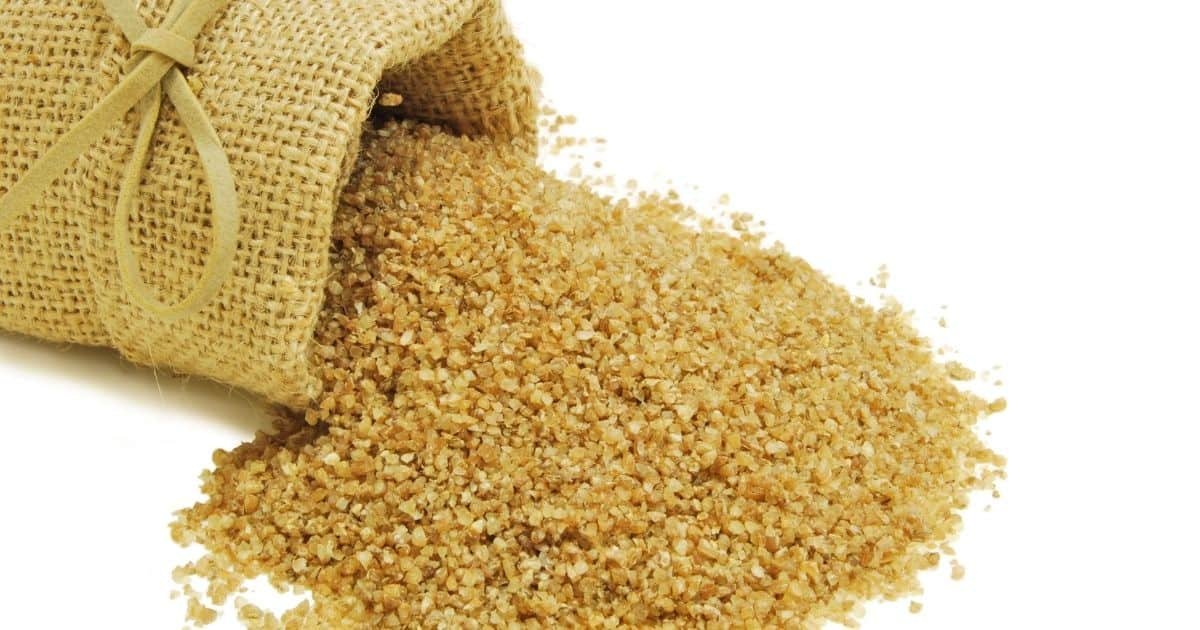Jamaican Bulgur Porridge is one of my favorite Jamaican porridges as it’s creamy, with a delicious slightly nutty earthy taste. If you haven’t tried Jamaican-style Bulgur porridge you’ll see for yourself why it’s a breakfast dish that you will be wanting over and over again!
Bulgur porridge is a well-loved porridge however, it’s not one of the most regularly served breakfast porridges in Jamaica, as it’s not as easy to get hold of as other porridge ingredients like cornmeal, peanuts, green bananas, green and green plantains.
Bulgur porridge is made from imported bulgur wheat which is mixed with locally grown Jamaican ingredients, such as coconut (milk), cinnamon, nutmeg, and cane sugar, which are all grown in the rich and fertile soil of Jamaica.
Although Bulgur Porridge may not always be available at Jamaican hotels it can be enjoyed when venturing out into the local area as it’s often available from Jamaican restaurants (cook shops) and from street vendors who will make a huge pot and sell it right through the day until sold out.
Nutritional Value of Bulgur Porridge
Bulgar is classed as a grain, as it’s made from cracked whole grain wheat berries that are parboiled and then dried, as they are cooked they take little time to prepare as they just need to be rehydrated.
With 33.8g of complex carbohydrates, 8.2g of fiber, and 5.6g of protein per cup, bulgur is filling and nutrient-dense.
Although cooked bulgur is a rich source of fiber and carbohydrates, it has a GI of 46 which is considered low on the glycemic index.
Cooked bulgur is also rich in B vitamins, which help convert the food we eat into energy, plus manganese, phosphorus, and selenium.
What Does Jamaican Bulgur Porridge Taste Like?
Jamaican Bulgur porridge has a creamy, slightly nutty earthy taste that is flavored with vanilla, coconut milk, and spicy cinnamon and nutmeg.
Jamaican bulgur porridge can be served hot or cold and is delicious topped with sliced or diced fruits, nuts, and a little nut butter. Or why not serve the traditional Jamaican way with a slice or two of buttered bread or crackers.
Quick Tips On Making Perfect Bulgur Porridge
If you are having problems getting the perfect consistency of your Jamaican bulgur porridge follow these easy instructions for getting it back on track and ready to enjoy!
My Bulgur Porridge Is Too Thick?
If your bulgur porridge becomes too thick you can always add some cold water or milk to loosen the porridge whilst stirring it on a low simmer. Continue stirring until the extra liquid is fully incorporated and if cooked through, take off the heat as it will re-thicken if left to dry out on the stove.
My Bulgur Porridge Is Too Runny and Thin?
If your bulgur porridge is too thin you can always add some blended oats (oatmeal) to the porridge whilst stirring it on a low simmer. Continue stirring until the oats are fully incorporated and cooked through, then take off the heat.
How Do I Get Rid Of Lumps In Bulgur Porridge?
If you have any lumps in your bulgur porridge you can try to disperse them by crushing them with the back of a spoon on the inside of the pot. Once crushed stir the bulgar porridge thoroughly until they are fully incorporated.
Add a little milk or water to loosen the bulgur porridge if necessary.
We have 4 Amazing Jamaican Bulgur Porridge Recipes for you to try that will suit all eating habits and lifestyles. Whether you want the authentic, traditional, Vegan, or healthy version of this delicious recipe you will be sure to find something you will love!
Quick And Easy Jamaican Bulgur Porridge Recipe

This recipe for Jamaican bulgur porridge is easy to follow and comes together in around 20 minutes.
This version of Jamaican bulgur porridge uses just a tablespoon of flour as a thickener, which can be subbed for GF flour if necessary.
Try this recipe for Traditional Jamaican Bulgur Porridge here…
Jamaican Bulgur Porridge Recipe
This recipe for a Jamaican Bulgur Porridge is totally delicious and will evoke memories of a childhood spent in the Caribbean.
With a chunky texture, this method of making bulgar porridge uses condensed milk and honey to sweeten it.

Jamaican Bulgur Porridge Recipe
This authentic bulgur porridge recipe uses oats to help thicken the porridge and is fully Vegan as no milk products are used to make this recipe.
If you are looking for a recipe with measurements, ingredients, and a full method, try one of the other tutorials we have featured above, as this video is for illustrative purposes only!
FAQ About Jamaican Bulgur Porridge
If you are thinking about making Jamaican bulgur porridge check out these FAQs and nutritional facts about who this recipe is ideal for and learn how you can substitute certain ingredients to make it suitable for all eating lifestyles.
Is Bulgur Porridge Vegan?
Bulgur porridge is traditionally made with a mix of coconut water, milk, and/or condensed milk, which makes it suitable for Vegetarians but not Vegans as these products contain cow’s milk.
However, by simply swapping out the cow’s milk for your preferred version of plant-based milk and/or adding some plant-based condensed milk you can totally enjoy this delicious and nutritious Jamaican breakfast porridge too.
If you want to try making a Veganized version of this dish check out the Vegan Jamaican Bulgur Porridge Recipe above…
Is Bulgur Porridge Alkaline or Acidic?
The fibre in Bulgur Wheat is in the form of resistant starch and oligosaccharides, carbohydrates of which around 90% escape digestion and produce short-chain fatty acids in the gut, which help to balance the blood Ph level and prevent it from becoming too acidic.
Is Green Plantain Porridge Gluten and Wheat Free?
Bulgar is made from cracked par-boiled wheat kernels and as such is NOT wheat and gluten-free.
Is Bulgur Porridge Good For High Blood Pressure?
Bulgur is the perfect option for decreasing the risk of protecting your heart health and helps prevent cardiovascular disorders and heart diseases, such as high blood pressure.
If you want to enjoy Jamaican bulgur porridge swap the cow’s milk / condensed milk, for almond (or other plant-based) milk, and go easy on the amount of sugar and salt that you add to the porridge. Why not try adding more cinnamon to the recipe instead, which is said to be a ‘false’ sweetener.
Can Diabetics Eat Bulgur Porridge?
Bulgur is not only a low glycemic food it is also a rich source of many vital minerals such as magnesium, and calcium which lower the risk of type 2 diabetes.
As bulgur takes time to break down in the intestine, it leads to a slow steady release of glucose in the body, which lessens the chances of sudden spikes or dips in blood sugar levels.
If you want to enjoy Jamaican bulgur porridge swap the cow’s milk / condensed milk, for almond (or other plant-based) milk and add coconut sugar, or stevia to sweeten. Or why not try adding more cinnamon to the recipe instead, which is said to be a ‘false’ sweetener.
If you want to try making a healthier version of this dish check out the Healthy Jamaican Bulgur Porridge Recipe above…
Is Jamaican Bulgur Porridge Healthy?
Providing you don’t add too much dairy/condensed milk and added sugar, bulgur porridge is very healthy as it contains fiber and nutrients that are good for heart health and regulate blood sugars.
Is Bulgur Porridge An Allergen?
Yes! Bulgur is made from wheat.
Check if anyone in your party is allergic or sensitive to wheat before serving Bulgur Porridge to anyone.
Can Babies Eat Bulgur Porridge?
Yes! Bulgur Porridge can be offered to babies from 6 months as they are packed full of beneficial nutrients, vitamins, and minerals.
The Benefits of Bulgur Porridge
Bulgar has a low glycemic index (low GI) which helps regulate the body’s blood sugar levels which makes them an ideal food for reducing the risk of diabetes.
Is Bulgur A Source Of Fiber?
Bulgar has a high amount of fiber and helps prevent issues like bloating and constipation, along with preventing heart disease and diabetes.
Is Bulgur A Source Of Carbohydrates?
Bulgur is are a great source of carbohydrates, with a whopping 76g per 100g.
Is Bulgur A Source of Protein?
No bulgur is not high in protein but they have many other amazing health benefits.




